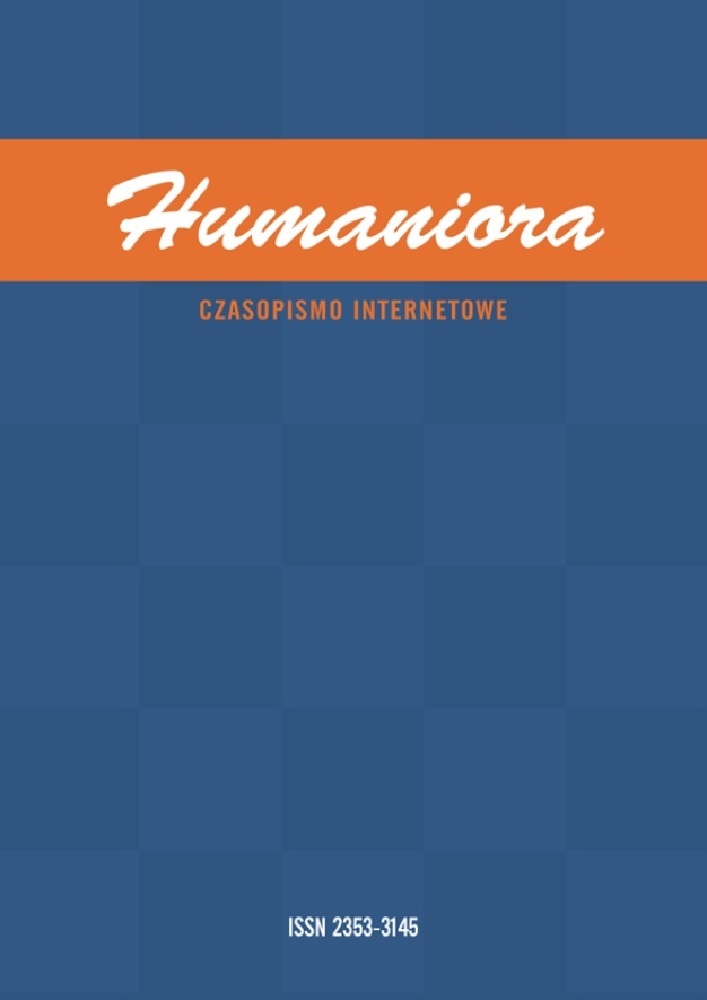Abstrakt
The following article aims to resolve the fundamental question referring to the way ideas exist in Augustine’s epistemology and also to familiarize the reader with contemporary interpretations of this issue. When framing his objectivist theory, Augustine drew on ancient traditions and the Bible, referring to deliberations on astronomy, cosmology and maths among others. In order for a work of art to be beautiful, it is necessary for human reason to perceive the right proportions in it, but their perfection does not depend solely on details and harmonious selection of parts, but also on something that links all these components to a mental idea. For Augustine, number is the principle of all things, but not in the sense of an arche, but in the sense of its presence in every being for example, the unity that the mind admires and of which it is itself an image. Its essence and meaning can only be found in God and therefore He is the first creator and greatest artist giving inspiration to all the arts. The thinker of Thagaste defined ideas as unalterable forms of things. In his view, all creation bears a certain trace of resemblance to God. That leads to a conclusion in the light of which every being is a greater or lesser implementation of the rules of res intelligibiles. The harmony of nature is of similar importance to him, as well as the beauty of the human body and mind. Facing the question of the ontological meaning of beauty author upholds its objectivity alongside other transcendental properties of being. Unity, equality, number, rhythm, proportion and order constitute the core elements of his aesthetics. The significance of Augustine’s doctrine lies in the fact that immaterial ideas enable achieving perfection in spiritual life, and hence bring us closer to the Creator.
Bibliografia
Augustyn św., Księga osiemdziesięciu trzech kwestii, transl. Ida Radziejowska, Wydawnictwo Marek Derewecki, Kęty 2012.
Augustyn św., O muzyce, in: Dialogi i pisma filozoficzne, vol. 4, transl. Danuta Turkowska, Pax, Warszawa 1954.
Augustyn św., O porządku, in: Dialogi filozoficzne, vol. 1, transl. Józef Modrzejewski, Pax, Warszawa 1953.
Augustyn św., O Trójcy Świętej, transl. Maria Stokowska, introduction Józef Tischner; afterwords and footnotes Jan Maria Szymusiak, Znak, Kraków 1996.
Augustyn św., O wierze prawdziwej, in: Dialogi filozoficzne, vol. 4, tłum. Jerzy Ptaszyński, Pax, Warszawa 1953.
Augustyn św., O wolnej woli, in: Dialogi filozoficzne, vol. 3, tłum. Anna Trombala, Pax, Warszawa 1953.
Augustyn św., Państwo Boże, transl. Władysław Kubicki, wstęp Jacek Salij, Wydawnictwo Antyk – Marek Derewiecki, Kęty 2002.
Augustyn św., Wyznania, transl. Zygmunt Kubiak, Instytut Wydawniczy Pax, Warszawa 1987.
Berkeley G., Alkifron, transl. Mikołaj Olszewski, “Biblioteka Europejska”, Wydawnictwo Marek Derewiecki, Antyk 2008.
Brudz J., Dowód św. Augustyna na istnienie Boga z prawd wiecznych, in: Alma Mater Tarnoviensis. Księga pamiątkowa z okazji 150 rocznicy założenia Instytutu Teologicznego i Seminarium Duchownego w Tarnowie (1821–1971), eds. P. Bednarczyk, F. Gawlik, Kuria Diecezjalna, Tarnów 1972.
Copleston F., Historia filozofii, vol. II: Od Augustyna do Szkota, transl. Sylwester Zalewski, Instytut Wydawniczy Pax, Warszawa 2000.
Gilson É., Wprowadzenie do nauki świętego Augustyna, transl. Zygmunt Jakimiak, Instytut Wydawniczy Pax, Warszawa 1953.
Grabmann M., Des hl. Augustinus, Quaestio de ideis, Mittelalterliches Geistesleben, Bd. II, München 1936.
Jan Paweł II, List Ojca świętego Jana Pawła II do Artystów, Drukarnia Watykańska, Watykan 1999.
Kälin B., Die Erkenntnislehre des hl. Augustinus, Buch und Kunstdruckerei Louis Ehrli in Sarnen 1921.
Karpowicz-Zbińkowska A., Harmonia Bożego dzieła stwórczego w dialogach filozoficznych św. Augustyna, “Studia Theologica Varsaviensia” 2006, no. 44/2.
Manoussakis J.P., Theophany and Indication, Reconciling Augustinian and Palamite Aesthetics, “Modern Theology” 2009, no. 26/1. DOI: https://doi.org/10.1111/j.1468-0025.2009.01580.x
Mausbach J., Die Ethik des heiligen Augustinus, Verlag Herder, Freiburg im Breisgau 1929.
O’Collins G., Farrugia E.G., Leksykon pojęć teologicznych i kościelnych z indeksem angielsko-polskim, transl. Jan Ożóg, Barbara Żak, WAM, Kraków 2002.
Puzio J., Teoria poznania zmysłowego u św. Augustyna, KUL, Lublin 1947.
Tatarkiewicz W., Historia estetyki, vol. 2: Estetyka średniowieczna, Arkady, Warszawa 1989.
The International Bible Society (https://www.biblica.com).
Zabielski S., Święty Augustyn i fenomenologia. Historycznofilozoficzna analiza stanowis¬ka Jana Hessena w kwestii intuicji augustyńskiej, Wydawnictwo Uniwersytetu Marii Curie-Skłodowskiej, Lublin 2003.
Licencja

Utwór dostępny jest na licencji Creative Commons Uznanie autorstwa – Bez utworów zależnych 4.0 Międzynarodowe.
Czasopismo oraz wszystkie zamieszczone w nim materiały są powszechnie dostępne i mogą być wykorzystywane do celów naukowych, edukacyjnych, poznawczych i niekomercyjnych bez konieczności uzyskiwania każdorazowej zgody autorów i redakcji. Nadesłanie artykułu do publikacji traktowane jest jako zgoda autora na udostępnienie swojej pracy i informacji w niej zawartych do powyżej wymienionych celów. W takich przypadkach należy jedynie wskazać źródło, z którego zaczerpnięte zostały informacje. Pobieranie opłat za dostęp do materiałów zawartych w czasopiśmie lub ograniczanie do niego dostępu jest zabronione.
Przesyłane do redakcji teksty muszą stanowić oryginalne prace, uprzednio nigdzie niepublikowane ani nie przedkładane innym redakcjom lub wydawcom. Autorzy nadsyłanych artykułów ponoszą odpowiedzialność za uzyskanie zezwoleń na publikowanie materiałów, do których prawa autorskie są w posiadaniu osób trzecich. Publikacja materiałów chronionych prawem autorskim jest możliwa pod warunkiem uprzedniego dostarczenia przez autora do redakcji pisemnej zgody właściciela praw autorskich.





